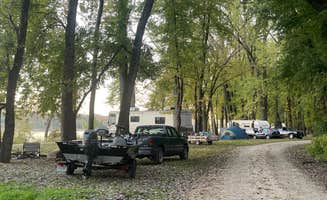Tent camping near Clayton, Illinois provides access to the Mississippi River corridor with options spanning three states. Campsites in this tri-state region encompass riverfront locations, lake access points, and recreational areas connected to the area's lock and dam infrastructure. Summer temperatures typically reach 85-90°F with high humidity, while spring and fall offer milder conditions for campers.
What to do
Fishing opportunities: Spillway Recreation Area offers direct access to Mark Twain Lake, known for crappie, bass, and catfish. The campground's proximity to the dam spillway creates unique fishing conditions throughout different seasons.
Water recreation: Spring Lake Campground features a lake for various water activities. One visitor notes, "I've stayed here every summer great place lots todo with the kids had a lake to fish, kayak, canoe. Has and outdoor skating rink next to the lake very neat."
Wildlife observation: The conservation areas near Clayton provide habitat for migrating birds and river wildlife. Camping at these locations allows for dawn and dusk wildlife viewing when animals are most active.
What campers like
River views: Ted Shanks Conservation Area (sometimes incorrectly listed as Dupont Reservation) offers waterfront sites. According to a visitor, "All sites fronting the river, shaded by trees. Mix of campers, fishermen and hunters. A few trains at night but not many."
Spacious sites: Many campers appreciate the room to spread out at Ted Shanks. One reviewer noted, "The campsites are large and pretty well maintained. Not many tables are available. The one I used was wobbly, but held up."
Family-friendly environments: John Spalding Recreation Area provides electric hookups with space for family camping. The drive-in access makes this location convenient for those bringing extra gear or camping supplies.
What you should know
Limited facilities: Most tent camping sites near Clayton are primitive with minimal amenities. At Bear Creek COE - Lock and Dam 21, expect no drinking water, electricity, or restroom facilities, requiring campers to be fully self-sufficient.
Seasonal flooding: River-adjacent campgrounds can flood during high water periods, typically in spring. A camper at Ted Shanks warns, "this area WILL flood if the river floods; it WILL be buggy in the summer as the campground backs to a large wetlands area."
Noise considerations: Both train tracks and river traffic create ambient noise at riverside campgrounds. One visitor mentioned, "on the other side of the wetlands is an active train track, so you may have train noise as well as barge noise on the river."
Tips for camping with families
Reservation planning: Popular campgrounds fill quickly during peak season. A Spring Lake visitor advises, "Nice place for kids and adults! Would highly recommend. Get there early or make reservations fills fast!"
Insect preparation: Wetland-adjacent campsites experience significant mosquito activity, particularly in summer months. Bring appropriate repellents and consider screened shelter options for meal preparation and gathering areas.
Recreation options: Choose campgrounds with built-in activities for children. Spring Lake Campground offers multiple recreation opportunities in one location, reducing the need to travel between activities with children.
Tips from RVers
Limited hookup availability: Most campgrounds in the Clayton area offer either primitive sites or electric-only hookups. Water and sewer connections are rare, so plan to arrive with full water tanks and empty waste tanks.
Site limitations: Many riverside campgrounds have smaller, uneven sites that aren't suitable for larger RVs. Scout locations in advance or call ahead to confirm access and turning radius for your specific vehicle size.
Seasonal considerations: Year-round campgrounds like Bear Creek may have limited winter access depending on road conditions and weather. Call ahead during winter months to confirm accessibility and available services.


